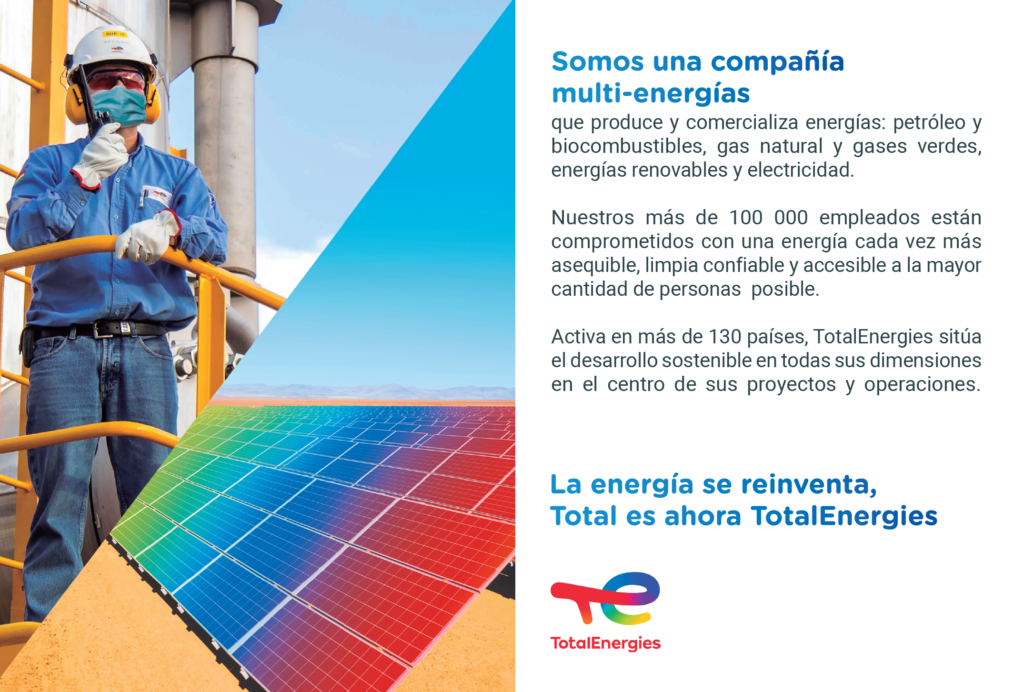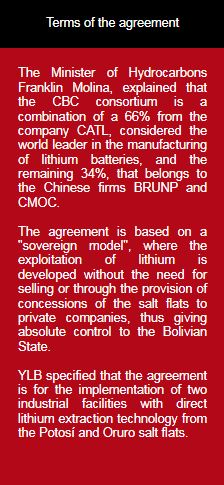An agreement signed with CBC has many loopholes that must be addressed in order to achieve a comprehensive and effective development of these projects. The analysts consider that there is no time to waste in order to promote the exploitation and industrialization of lithium, which is a priority since the country needs new sources of income after the fall in hydrocarbons production.
ISSUE 115 | 2022
Elizabeth Álvares Riva
The production and industrialization of lithium in Bolivia can move forward in four to five years if reasonable terms and conditions are reached between the Government and the Chinese consortium CBC, as well as the implementation of the most suitable technology, otherwise, further delays will continue with negative consequences for the country and its development, according to specialists.
Recently, the state-owned company Yacimientos de Litio Bolivianos (YBL) and the company CATL BRUNP & CMOC (CBC) signed a study agreement with an initial duration of six months for the implementation of two industrial facilities with Direct Lithium Extraction technology, in the Bolivian salt flats of Uyuni and Coipasa. CATL is the largest company in the world for the production of lithium batteries, which brings a lot of expectation for this agreement.
“It is necessary to create the conditions for comprehensive development so that this consortium stays and works in the country supporting the exploitation and industrialization of lithium, because if we cannot do it with them, it will be very difficult to do it with others,” said industrial engineer Carlos Delius, former president of the Bolivian Hydrocarbons and Energy Chamber (CBHE) during ‘’The Lithium Situation in Bolivia’’ colloquium, organized by ENERGÍABolivia magazine.
“This is one of the few opportunities that the country has to develop this industry, in this context, if things are done well, the benefits of lithium could be seen in four to five years. Instead of 10 years, which is the timeline needed to see actual results in Oil&Gas projects if serious exploration and development are really undertaken,” he added.

OBSERVATIONS TO THE AGREEMENT
Juan Carlos Zuleta, an analyst of the lithium economy, agrees that it is necessary to create the conditions so that investors can work in the country while achieving the long-awaited and desired progress for Bolivia. However, he believes that at least one or two more companies or consortiums should be considered for the exploitation and industrialization of lithium, given the magnitude of the country’s resources.
The economist also observes that the agreement signed between YLB and CBC is unclear, first of all because the objectives are not clearly defined, and on the other hand, the conditions and timeframe under which the consortium’s investments will be returned are equally ambiguous. He said that what is needed is a long-term contract, with clear rules and certainty for the investor and the country.

“It is only an agreement with a duration of six months that can be extended for a year, not a contract, that is what makes it very peculiar. The announced investment is considerable, one thousand eighty million dollars, but it is not clear how it will be returned or for how long. It was said that it would be returned with lithium, but those aspects and additional details are not clear yet,” said Zuleta.
Among the details observed, he mentions that CBC is getting into the project through a “service contract” and that it intends to extract around 25,000 tons of lithium from Oruro’s salt flats and another 25,000 tons from Uyuni’s salt flats during the first phase of the project, despite the fact that both reservoirs do not have any similarity in size or mineral concentration.

“The progress in the production of technical grade lithium carbonate do not have a significant development, since the original goal was to produce battery grade lithium and we have not done it”
Juan Carlos Zuleta highlights the quality of the Chinese company CATL, however, he questions the participation of the other two companies that make up the consortium. “CATL is a top-level player, but it would have been better if it had come with another world-class player in lithium exploitation and that has not happened, it has brought two players who are not relevant in this very important strategic game”, he said when referring to CMOC and BRUNP, the latter a Chinese company specialized in lithium recycling.
PRODUCTION DELAY
Both specialists agree in pointing out that the Government of Bolivia made very little progress in the exploitation and industrialization of lithium. “Not enough emphasis has been placed on making a comprehensive design of all the conditions that are needed to achieve a significant development,” said Carlos Delius.
“The progress in the production of technical grade lithium carbonate does not have a significant development, since the original goal was to produce battery grade lithium and we have not done it,” said Juan Carlos Zuleta, referring to the work carried out so far by YLB.
They also said that it is necessary to give certain autonomy to the companies that invest in the Bolivian salt flats, to achieve the goal set by the Government, which is producing lithium batteries on a large scale until 2025. In other words, Delius mentions the possibility of doing good business from lithium exploitation and Zuleta insists on the importance of the industrialization of white gold in the country.

“Our people have to leave the ideology and get to work on this as it should be; as a complex business for the development of Uyuni’s salt flats, which has an immense potential.”
To overcome the deficiencies of qualified labor and the market needs for these batteries in Bolivia, Zuleta proposes the formation of an international consortium, with the participation of companies from different South American countries that can encourage the industry in Bolivia. Carlos Delius considers that the CBC Consortium, during the first year of the initial agreement, will negotiate the best conditions with the Government to be able to stay and operate in Bolivia but, apparently, only to proceed with the extraction of lithium and not the industrialization. “Our people have to leave the ideology and get to work on this as it should be; as a complex business for the development of Uyuni’s salt flats, which has an immense potential”, he said, as well of recommending that it is even time to open participation for other companies dedicated to the lithium business.
Once again, they consider that an excessive participation of the State can hinder the lithium project that the country needs to promote, first of all, to foster the development of Potosí and Oruro where the salt flats are located, and also, to mitigate the loss of resources that used to be available from Oil&Gas exports that now are limited due to the low production of the depleting reservoirs.
“We must not forget the regional demands, the Civic Committee of Potosi, has already proposed a bill project that is in accordance with the circumstances, they want the participation of national and foreign companies to be opened in the different stages of the value chain, which is what had to be done since the beginning and obviously, they are asking for more royalties and that is natural. However, these royalties requests that are negotiated in Consensus with Oruro, are not very high and these are ranging from 11% to 20%. For instance, In Chile, these royalties could reach almost 40%,” Zuleta pointed out.
In this context, the pendular positions around lithium continue in Bolivia: one of these positions bets on understanding the integral development of lithium as a business where it is possible that the country only offers raw material; and, the other, insists on promoting the industrialization of lithium, based on the management of the entire value chain, without resolving critical aspects such as investment, technology, market and prices. A complicated vicious circle that does not end by solving equations beyond a political speech.
